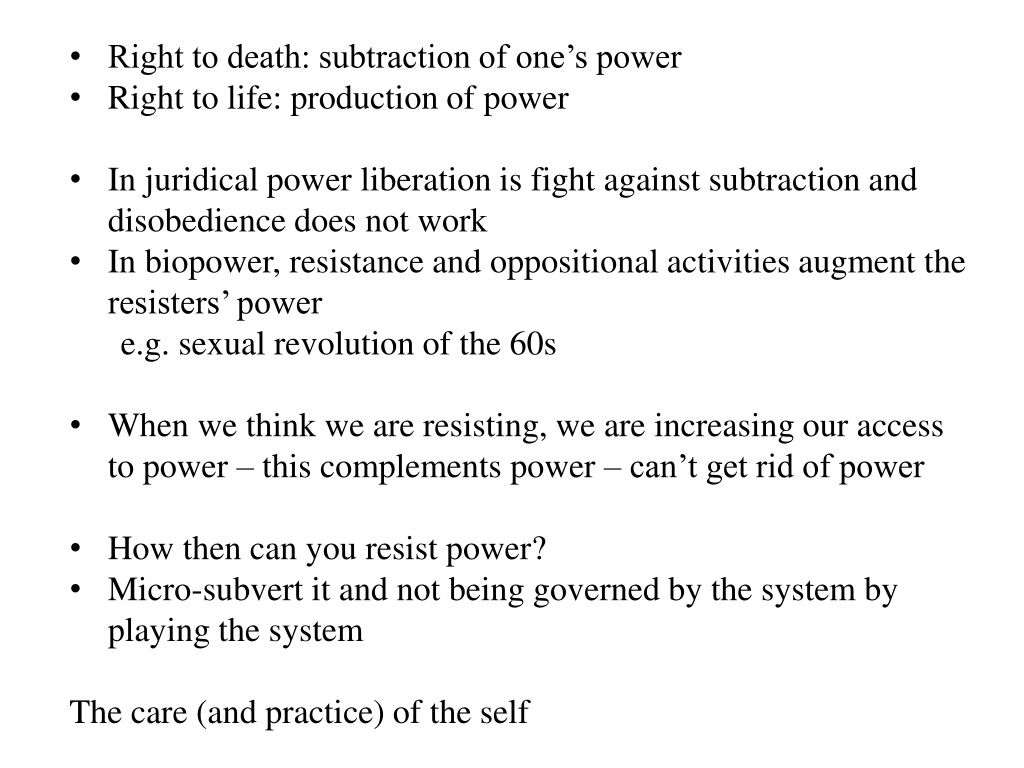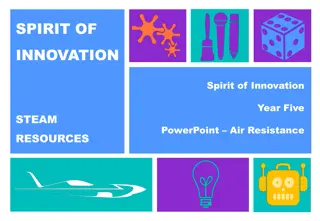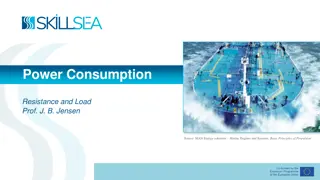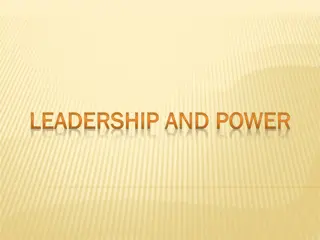Analyzing Power Dynamics and Resistance Strategies in Modern Society
Examination of power dynamics in society, focusing on how resistance can increase access to power. Insights from Judith Butler and Michel Foucault on resisting normative power structures through subversion and imperfect repetitions. Discusses truth production by institutions and media commodification. Contrasts between Savoir (real knowledge) and Connaissance (superficial knowledge). Strategies for resisting power through micro-subversion and self-care in the face of dominant structures.
Download Presentation

Please find below an Image/Link to download the presentation.
The content on the website is provided AS IS for your information and personal use only. It may not be sold, licensed, or shared on other websites without obtaining consent from the author. Download presentation by click this link. If you encounter any issues during the download, it is possible that the publisher has removed the file from their server.
E N D
Presentation Transcript
Right to death: subtraction of ones power Right to life: production of power In juridical power liberation is fight against subtraction and disobedience does not work In biopower, resistance and oppositional activities augment the resisters power e.g. sexual revolution of the 60s When we think we are resisting, we are increasing our access to power this complements power can t get rid of power How then can you resist power? Micro-subvert it and not being governed by the system by playing the system The care (and practice) of the self
Judith Butler: http://www.egs.edu/faculty/judith-butler/articles/foucault-and-the-paradox-of-bodily-inscriptions/ Resist normative power Gender Trouble: normalization is repeated performance normative is repetition of the norm Resist hierarchal binarism e.g.: drag queens- better women (high normative feminism) compared to women Subversion by changing a little each time you represent through disruption Repetitions often fail to perfectly conform to the norms that inspire/require them. How many of us fail to perform ideal (hetero, white, able- bodied, middle-class) masculinity or femininity? Even most hetero white able-bodied middle-class women fail to perform ideal femininity In the potential for (intentionally or unintentionally) imperfect repetitions, that disciplinary power produces its own resistances.
Truth is produced by institutions and by scientific discourses formulated in relation to these institutions The state s (or any organized) dominant economic and political structures control the production and transmission of the truth We assume it is truth when it becomes hardened into an unalterable form in the long baking process of history http://jamintoo.multiply.com/recipes/item/70?&show_interstitial=1&u=%2Frecipes%2Fitem F s Genealogy s role: to connect different events according to the emergence of different interpretations to explain these different interpretations as a perspective rather than a universal or transcendental truth. Foucault utilizes genealogy to figure out the various practices applied on the body and the dominating powers that produce such practices.
How media makes you a commodity: Graduates essentialized as earning machines September 22, 2011
F s Savoir and Connaissance : Savoir: (what we call real knowledge) To know or to be known to know as well as knowledge e.g., a theorem, a continent, an atom, It can be quite abstract or concrete Such knowledge is not genuine if its object is nonexistent or false It need not be the product of a reliable method or pedagogy It need not be precise or fully justified It can fall short of proof a domain not of things known but of things to be known Connaissance: relatively superficial mode of knowledge, Grounded in incomplete information or incomplete research or knowledge of minimal degree It could only be translated as cognition or learning or a body of learning or expertise Tied to highly developed apparatuses of justification , modes of competence supported by well-crystallized apparatuses of background training. A cognitive state is an effect of power
Foucault s biopower It is a technology which appeared in the late eighteenth century for managing populations. It incorporates disciplinary power. Disciplinary power is about training the actions of individuals (their bodies) Biopower is that of official organizations (the state or government) managing the society: births, deaths, reproduction and illnesses of a population. Refer to the practice of modern states and their regulation of their subjects through "an explosion of numerous and diverse techniques for achieving the subjugations of bodies and the control of populations. (Foucault).
Humphreys, A (2007): 1.Foucault s examples of power/knowledge at work in mechanisms of discipline cf. in the science of marketing. Marketers use Internet tools to discipline consumers by individuating, surveying, and legitimizing their preferences 2.Documentation of every individual Essentialize them using their past and present preferences to diagnosing future tendencies (psychoanalyst has expertise, knowledge claim , and thus power over his patient) 3.Mechanism of individuation by wish list i.e., consumer identity (classifying, organizing, and labeling them) for marketing analysis 4.Consumers living in our narcissistic culture want to be watched. Not paranoids as being seen in the Panopticon 5.In image culture, the embeddedness of the gaze i.e., gaze is internalized by controlling how consumers themselves see 6.Consumer insists that he then can reason and resist, e.g. Illegalities: Pilfering Versus File Sharing these forms of resistance from within occur in the form of practice, i.e.,ethics rather than morals.
Foucault: Biopower constructs a Docile Body 1. Surveilled Body 2. Objectified Body 3. Controlled Body 4. Disciplined body Discipline is the Technology of Power that turns the body docile. Repetitive, trained: http://www.youtube.com/watch?v=ZfFhuj1VONw
Power shapes bodies into : (Foucault, Michel (1995). Discipline and Punish: The Birth of the Prison.) 1.Objectified Body From the Classical age : the body as object, a target of power - body is manipulated, shaped trained, made to obey and learn skills & rules - body is used, subjected and analyzed and manipulated 2. Controlled Body: Works individually in retail - Coercion is used to shape/ improve movement, attitudes, gestures; Body s modes and economy are tailored for efficient control through uninterrupted coercion 3. Disciplined body: The body is disciplined through surveillance and control in all aspects as to turn it docile. Discipline produces pracitised bodies .
1.Objectified Body From the Classical age : the body as object, a target of power - body is manipulated, shaped trained, made to obey and learn skills & rules - body is used, subjected and analyzed and manipulated Keller (2005):Ab/Normal Looking: Voyeurism and surveillance in lesbian pulp novels and US Cold War culture, Feminist Media Studies, 5 (2):177-195. Popular culture is the space of homogenization - Stereotyping objectifies the matter, person and experience Voyeurism controls the private, the sexual Surveillance controls the public, the criminal, and political. Bond & Playboy - Gaze, the voyeuristic eye, coding woman as its object [Popular culture is] the space of homogenization where stereotyping and the formulaic mercilessly process the material and experiences it draws into its web ... It is rooted in popular experience and available for expropriation at one and the same time ... [A]ll popular cultures ... are] bound to be contradictory ... site[s] (pp. 469-70) of strategic contestation. (Stuart Hall 1996, )
2. Controlled Body: (Foucault) Works individually in retail - Coercion is used to shape/ improve movement, attitudes, gestures; Body s modes and economy are tailored for efficient control through uninterrupted coercion Keller (2005): Coercion through voyeurism: Voyeurism in popular culture serves as a method for the dominant culture to control the Other Voyeurism is also a desire to identify with the Other while simultaneously desiring to guard the boundary between self and Other Inscribing the self : The gaze controls and punishes: We come to know how we are constituted and who we are through the way we represent and imagine ourselves Desires are both satiated and punished
3. Disciplined body: The body is disciplined through surveillance and control in all aspects as to turn it docile. Discipline produces pracitised bodies Disciplining a result of : Media systematically objectifies bodies the public are socialized to assume an outsider s view of their body. They learn to objectify themselves. Thus, surveillance and monitoring their appearance becomes a habit ( body Surveillance ) (Aubrey, 2006)
Foucault (Discipline and Punish) Disciplining is the technology of Power: Body is monitored in its individual movements for the economy of motion through constant coercion To dominate and keep it docile, formal rules are implemented: Forcing obedience dissociates power from the body, which ensures an increasing spiral of obedience and utility (Discipline & Punish, p.138) Disciplinary blueprint is established through: Controlling a multiplicity of often minor body operations Collectively the above continual operations produce a disciplining blueprint.
Mechanisms of normalization through disciplining the body: Surveillance Surveyed and legitimized Described, judged, measured Essentialized Classified, organized, and labeled Power/knowledge created by this science comes from statistical analysis and qualitative groupings made by experts Viewed and scrutinized, itemized, measured and enumerated in data banks Very different relationship to space and time and to existential experience
Kelly, P. et al (2007): Individualization, Normalization & Body shaped by knowledge/power F s ethical self formation through diversity of conduct: Determination of ethical substance Mode of subjection Ethical work Purpose of the ethical subject A Corporate Athlete : normalized body; health of the body over the role of the mind; profile score of body fitness; corporate health is linked to employees health; freedom/ethics of self is practiced in pursuit of management devised (outsourced) goals; one becomes such a person through the discursive practices: being balanced, effective, regular.
Fs Ethical self: Fs themes for Plagiarism/cheating Advanced Capitalist society: cut-throat competition, insecurities and uncertainties in the workplace. Individualized worker/citizen: They have to exercise/practice their freedom in specific ways that conforms to the expectation of the market place F s term Conduct : equivocal in nature- is it conformity to power as it suits one s purpose or is it questioned as unethical Character (Sennett, R. (1998) cited in Kelly (2007)): loyalty, mutual commitment, ethical value of our desires and of our relations with others. How do we decide what is of lasting value in ourselves in a society that pushes immediate gratification? F s process of formation of an ethical self.























